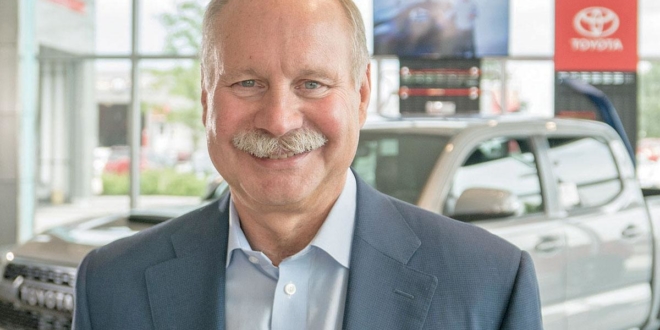
Steve Germain drew on business relationships developed in the years prior to the recession.
Partnerships — with automakers, financing companies and others — saved Germain Motor Co. during the Great Recession, says Steve Germain, CEO of the Columbus, Ohio, dealership group.
“I think even our partners were not quite sure what to do, and we all felt like we needed each other,” Germain told Automotive News.
For Germain, one of the early signs that the downturn would be severe remains especially vivid. In 2008, as it was becoming obvious the auto industry was deteriorating rapidly, Germain recalls seeing the front page of his local newspaper’s business section one day. On it was an article talking about the auto group’s decreasing sales and falling business.
While Germain typically left the business section of the paper at home for his wife to read, he brought that one to work that day.
“I didn’t think that she needed to see it,” Germain said, though his wife heard of the front-page story shortly after. “The reality set in at that point in time that we had some challenges ahead of us.”
The group lost a Chevrolet store, but Germain said it was not a large part of the group’s business. Later, though, the group saw sales at its stores collapse anywhere from 30 to 40 percent.
Cultivating relationships
Because of this, Germain sought help from outside partners — many of them relationships he had been cultivating for years.
“We felt a strong need to rely on partners that we have developed in the years prior to the recession,” Germain said.
Steve Germain
- Title then: CEO
- Dealership group: Germain Motor Co.
- Where: Columbus, Ohio
- Survival strategy: Draw on partnerships with finance and other companies, rethink hiring policies
In addition, Germain changed his personnel policies. He began hiring nonautomotive candidates for sales positions, identifying candidates differently and changing who was hired and how they were onboarded.
“We felt like there needed to be a change in customer experience,” Germain said. “We’re a much better dealership group as it relates to used cars and fixed operations today.”
Germain, along with other dealers who steered their dealerships away from bankruptcy and failure during the crisis, credited much of his success to the federal Cash for Clunkers program.
“From that point on — whether it was just timing or whether it really impacted the sales process, it’s hard to say — Cash for Clunkers was a great event,” he said. “I think it saved a couple hundred thousand jobs and at the end of the day, had a tremendous positive impact on the economy.”
Changes that stayed
While no dealer recalls the recession fondly, Germain in hindsight appreciates the changes that it brought to his business strategies, many of which remain in place. He also noted the group is back to the same sales volume it saw 11 years ago.
“We’re a much more efficient operation than we were 10 or 11 years ago as a result of that downturn,” Germain said. “We’re grateful for the opportunity to still be in business.”
Germain went back to his roots with the recession, saying it strengthened both personal and professional relationships.
“Good things came of that time, and we’ll never forget and always appreciate what we have,” Germain said. “It was a time in our industry and in our professional careers that hasn’t been forgotten, and the impact that it had and is still having on us as individuals and as an industry is obvious and significant.”
